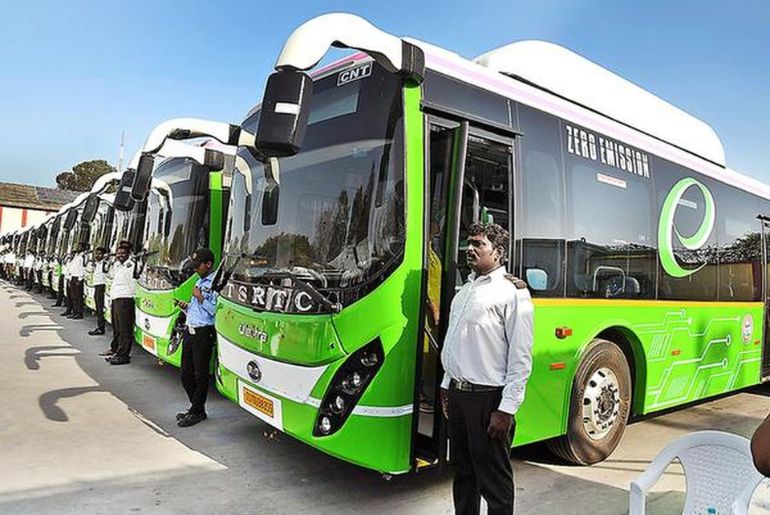In a major step toward accelerating India’s transition to green mobility, Convergence Energy Services Limited (CESL) has announced plans to launch a mega tender for 10,900 electric buses under the National Electric Bus Programme (NEBP) and the PM e-Bus Sewa initiative. The tender, set to open on November 6, 2025, aims to deploy zero-emission buses across multiple major cities, including Delhi, Bengaluru, Hyderabad, Ahmedabad, and Surat.
This move marks one of the largest electric bus procurements in India’s history, reflecting the government’s growing focus on clean, sustainable public transport solutions and its goal to significantly reduce urban air pollution.
Key Details of the CESL Tender
According to officials from CESL, the tender will cover 10,900 buses distributed among major Indian metros:
-
Bengaluru: Approximately 4,500 buses
-
Delhi: Around 2,800 buses
-
Hyderabad: About 2,000 buses
-
Ahmedabad and Surat: Nearly 1,600 buses combined
The tender will include a mix of standard floor, low floor, and BRT-type buses, both AC and non-AC, designed to meet the operational needs of different urban environments.
Each selected operator will enter into long-term contracts with city transport corporations under a Gross Cost Contract (GCC) model, where private companies operate and maintain buses while the government pays per kilometre of service.
Part of India’s Broader Electric Mobility Push
This large-scale tender is part of the PM e-Bus Sewa initiative, which targets the deployment of 50,000 e-buses across India by 2030. The National Electric Bus Programme (NEBP), implemented by CESL under the Ministry of Power, is working to aggregate demand and streamline procurement across states to achieve economies of scale.
By adopting an aggregated procurement model, CESL aims to reduce costs, improve efficiency, and encourage local manufacturing of electric buses and components under the Make in India initiative.
Officials from CESL stated that the tender will be technology-neutral, allowing participation from a wide range of manufacturers and operators, including leading EV makers and bus OEMs.
Infrastructure and Employment Benefits
The tender will enhance public transportation and stimulate the electric mobility ecosystem in India. It includes provisions for:
-
Setting up charging depots and maintenance facilities.
-
Hiring a local workforce, including women drivers and engineers.
-
We are also implementing gender-inclusive policies in EV operations.
-
Ensuring strict service-level agreements (SLAs) to maintain high uptime and efficiency.
Each deployed e-bus is estimated to reduce 1,000 tonnenes of CO₂ emissions over its operational lifetime, resulting in multi-million-tonne emission reductions nationwide once the full fleet is operational.
Challenges and Implementation Plans
While the announcement has been widely welcomed, industry experts have emphasised the importance of infrastructure readiness. Cities will need to ensure adequate charging infrastructure, grid stability, and maintenance support to avoid downtime once the buses are deployed.
There are also concerns around timely project execution, as earlier phases of electric bus tenders under FAME II faced delays due to battery supply constraints and infrastructure bottlenecks.
However, CESL officials assured that this tender will benefit from the lessons learnt in previous phases. “We are focusing on robust contract management and depot readiness to ensure faster rollout and operational reliability,” a senior CESL spokesperson said.
Driving India’s Green Public Transport Vision
The CESL tender aligns with India’s National Electric Mobility Mission Plan (NEMMP), which aims to electrify 30% of public transport by 2030. With this tender, India’s total e-bus fleet could exceed 25,000 vehicles by 2026, making it one of the largest globally.
Experts believe that such mega-tenders will help standardise e-bus specifications, reduce procurement costs, and enhance investor confidence in the EV transport sector.
“This initiative represents a critical milestone in India’s electric mobility journey. Large-scale tenders like CESL’s are key to achieving both economic and environmental sustainability,” said a transport policy analyst from the International Council on Clean Transportation (ICCT).
Conclusion: A Milestone in India’s Sustainable Mobility Journey
The CESL mega tender for 10,900 electric buses marks a defining moment in India’s pursuit of clean, reliable, and modern urban transport. By electrifying major city fleets, the initiative is set to improve air quality, commuter comfort, and energy efficiency while contributing to India’s net-zero emission goals.
If implemented effectively, this project could serve as a benchmark for future large-scale EV deployments across Asia and reinforce India’s position as a leader in sustainable mobility.

